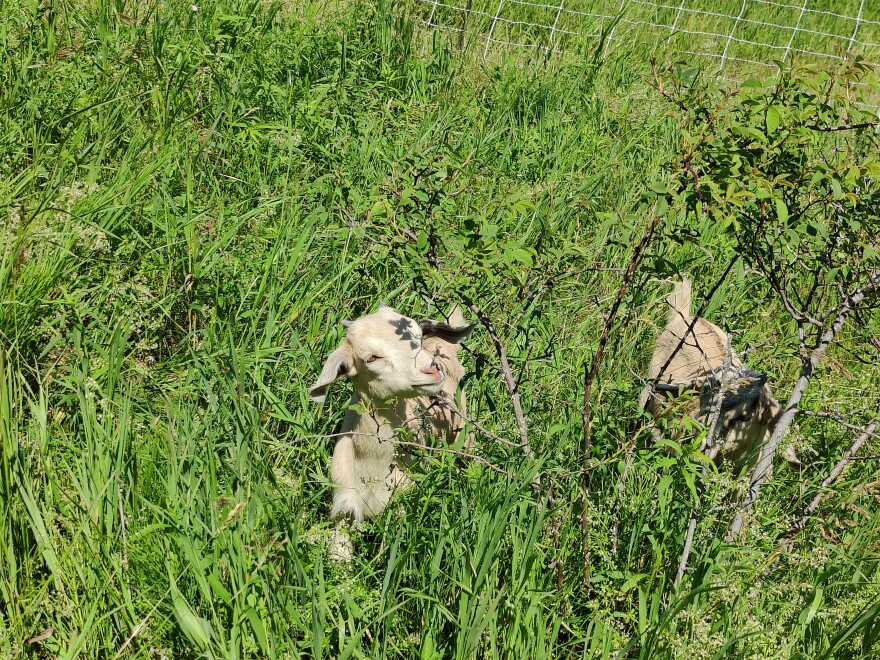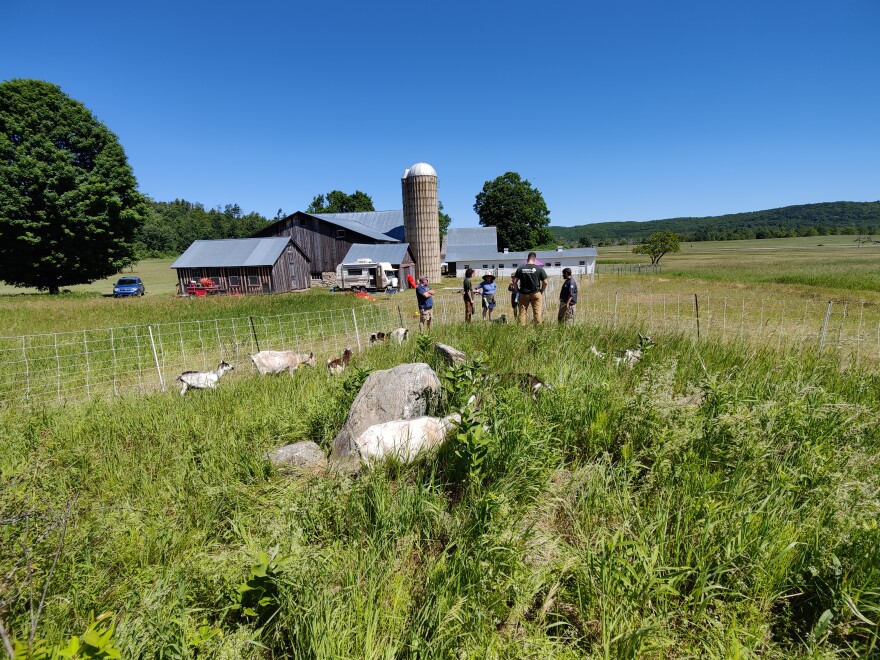Every summer, visitors from downstate come to Sleeping Bear Dunes National Lakeshore. But this year, some of those visitors have hooves – and they’ll eat anything.
Because they’re goats.
On a sunny summer morning, Amy McIntyre and 19 of her goats walk around a historic farm in Port Oneida. They’re here to eat invasive plants — and along the way they’ll provide job opportunities to local teens.
GETTING HER GOATS
Amy bought her first goat in 2012. She wanted to make goat milk ice cream for her daughter, who’s lactose intolerant.
“So I stopped jazzercising and bought a goat with that money,” McIntyre said. “We bred her, and then we started making soaps and lotions.”
That’s how City Girls Farm got started: first as a personal creamery, then a soap and lotion business in Pontiac, near Detroit. But in 2018, six kids were born, and four were male.
“There’s not a lot of use for males in agriculture,” McIntyre said. “So my husband and I decided at that time that we were going to start our conservation grazing program.”
Conservation grazing is a growing practice. It’s when you use a herd of animals to mow down invasive plant species to stop them from seeding and spreading.
For her first few grazing gigs, McIntyre had to work out the kinks, like how to transport the goats safely.
“I used to rent a U-Haul van and I would take them around town in a U-Haul with blue tarps and straw,” she said. ”And that’s how I got the goats around.”
IN DEMAND
Since then, McIntyre has purchased a proper livestock trailer. She said she’s found more work up north than downstate.
In 2018, the herd was grazing garlic mustard for the Leelanau Conservancy. Now, they’re chowing down on autumn olive for the national park service, here in Port Oneida. Autumn olive is an aggressive thorny shrub native to Asia.
“The goats love it,” McIntyre said. “By eating all the greens off, they’re preventing it from going to fruit so the birds can’t eat the seeds and spread it.”
While bird droppings can spread invasive seeds, McIntyre says that a goat’s four-chambered stomach destroys seeds entirely.
“You’ll see their cheeks puff out, and that’s them spitting up their cud. They chew it again, so they’re grinding it again. So when they eliminate, there are no seeds in their manure,” McIntyre said. “That’s the beauty of them.”

JOB OPPORTUNITIES
The goats do a lot of the work, but McIntyre said she used to be set back by a lack of human help. Before the goats get to work, she has to set up hundreds of feet of fencing to keep them contained.
“For one person to move that – it’s difficult,” McIntyre said.
She said a partnership this summer has solved her labor problem. She’s had help from YouthWork, a program run by Child and Family Services of Northwestern Michigan.
“We’ve done a lot of invasive species work for the park and for other folks, and we really don’t want to use chemical herbicides,” said Bill Watson, the director of YouthWork. “But this is a really incredible ecological solution to help with invasive species.”

Watson said the benefits of this goat grazing work go beyond just the plant community in the national lakeshore.
“We work with kids in crisis and families in crisis, and the goats give us a chance to bring on youthwork members who are gonna be working with these animals, learning animal husbandry with Amy, learning about the ecological solutions,” Watson said. “And at the same time, they build a relationship with these incredible animals.”
YouthWork is funding this project with a grant from the National Park Foundation, so it’s a win-win for City Girls Farm and Sleeping Bear Dunes.
“I think now that we’re finally as we say hooves on the ground, now we can really look forward to next year and everything we could do,” said McIntyre.
McIntyre and her goats have plans to move up here permanently – but the business won’t change names.
“Nope. City Girls Farm. That’s what it is,” McIntyre said. “Because people will see us and go, ‘oh it’s the city girls.’”


